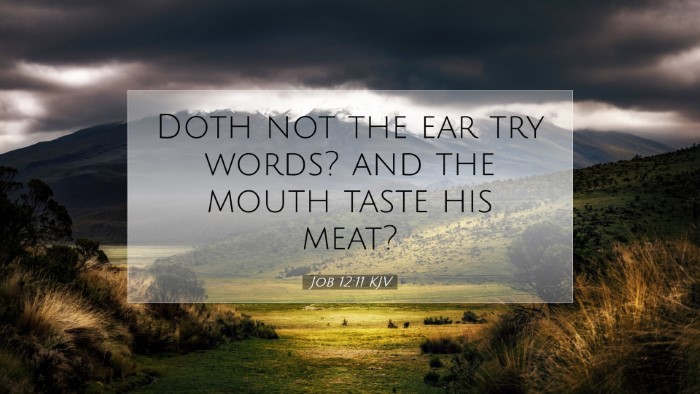Old Testament
Genesis Exodus Leviticus Numbers Deuteronomy Joshua Judges Ruth 1 Samuel 2 Samuel 1 Kings 2 Kings 1 Chronicles 2 Chronicles Ezra Nehemiah Esther Job Psalms Proverbs Ecclesiastes Song of Solomon Isaiah Jeremiah Lamentations Ezekiel Daniel Hosea Joel Amos Obadiah Jonah Micah Nahum Habakkuk Zephaniah Haggai Zechariah MalachiJob 12:11
Job 12:11 KJV
Doth not the ear try words? and the mouth taste his meat?
Job 12:11 Bible Commentary
Commentary on Job 12:11
Verse: "Doth not the ear try words? and the mouth taste his meat?" (Job 12:11, KJV)
Introduction
The Book of Job presents a profound exploration of suffering, faith, and divine justice. In Job 12:11, Job poses a rhetorical question emphasizing the role of discernment in understanding wisdom and truth. This verse symbolizes the deep connection between sensory perception and spiritual insight. Through this commentary, we will explore insights from esteemed theologians and scholars, offering meaningful reflections for pastors, students, theologians, and Bible scholars.
Insights from Public Domain Commentaries
Matthew Henry's Commentary
Matthew Henry asserts that this verse underscores the fundamental principle that just as the ear distinguishes sounds and words, so should the mind and heart discern truths and principles. He emphasizes the importance of a reflective and discerning spirit in spiritual matters.
- Spiritual Discernment: The ear represents spiritual perception; believers must test and evaluate teachings, ensuring they align with God's truth.
- Experience and Wisdom: Henry notes that experience, akin to tasting food, allows individuals to gain understanding. The wise will examine and savor the truth of God’s Word, discerning what is spiritually nourishing.
Albert Barnes' Notes on the Bible
Albert Barnes elaborates that the comparison made by Job highlights the functional roles of hearing and tasting as metaphors for understanding and accepting divine wisdom. Barnes emphasizes that the act of "tasting" requires an active engagement with truth, suggesting that knowing God requires taste, experience, and not just passive acceptance.
- Judgment of Truth: Just as one will judge the quality of food by taste, one ought to judge doctrines and teachings through careful listening and reflection.
- God’s Communication: Barnes points out that God communicates truth in a manner that invites humans to engage deeply, like a meal meant to be savored rather than rushed through.
Adam Clarke's Commentary
Adam Clarke interprets Job's statement as an affirmation of the inherent capacity of humans to engage with knowledge deeply. Clarke notes that discernment is crucial when navigating the complexities of life and faith. He underscores an essential element of the human condition—the need for wisdom paired with experience.
- Critical Engagement: Clarke stresses that the ability to "taste" truth is essential for spiritual growth. Engagement with Scripture should be reflective and analytical, much as one would assess the flavor of food.
- soul's Appetite: Clarke comments on the soul's hunger for truth, equating it to the physical body’s need for sustenance. Just as the body discerns between wholesome and harmful foods, so too must the spirit discern between beneficial and detrimental teachings.
Theological Implications
The theological implications of Job 12:11 stretch far beyond mere rhetorical inquiry. This verse challenges believers to cultivate an approach to scripture and doctrine that is active and discerning.
- Engagement with Scripture: The verse invites readers to examine how they interact with the Bible; are they merely consuming it or truly tasting and digesting the truths within?
- The Role of Experience: It emphasizes the necessity for experiential learning in faith. Just as one tastes to understand food, believers must engage in life experiences to grasp the fullness of God’s revelations.
- Community Discernment: The church community plays a vital role in discerning truth. This verse infers the collective responsibility of believers to test teachings against the Word of God.
Practical Applications
For pastors, students, and theologians, Job 12:11 serves not only as an inspirational verse but also as a guide for practical application in ministry and study.
- Preparing Sermons: Pastors are encouraged to prepare sermons that engage the senses of their congregation, making Scripture come alive through vivid illustrations that allow the ‘taste’ of God's word.
- Teaching Methods: Students should adopt methods that involve critical thinking and experiential learning, leading them to engage more deeply with biblical texts.
- Dialogue within the Church: The phrase invites a culture of open dialogue where church members can discuss differing interpretations and 'taste' truths together, enriching their spiritual diets.
Conclusion
Job 12:11 provocatively calls believers to engage with their faith in a meaningful and discerning manner. Drawing from the insights of Matthew Henry, Albert Barnes, and Adam Clarke, we are reminded of the imperative nature of wisdom, discernment, and experience in our spiritual journeys. May readers reflect deeply on this verse and implement its teachings in ways that enhance their communion with God, their understanding of His word, and their relationships with one another.


